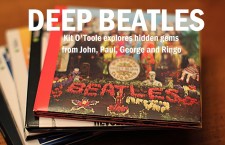Glyn Johns was famously brought in to make some sense of the hours upon hours of rehearsal tapes that eventually became the Beatles’ Let It Be, though both of his initial mixes were subsequently rejected. He’d envisioned the project, then titled Get Back, as a verite project — something that showed the Beatles as they were, with studio flubs, off-the-cuff chatter and goofy cover tunes in tact.
That’s not how it turned out, of course. John Lennon subsequently passed the moldering tapes to Phil Spector, who then added his infamous Wall of Sound production techniques to an album that had once been framed as an attempt to get back to the basics.
Johns, in a new talk with the New York Times, clearly remains horrified — 45 years later.
“I was disappointed that Lennon got away with giving it to Spector, and even more disappointed with what Spector did to it,” says Johns, who has just released a new memoir titled Sound Man. “It has nothing to do with the Beatles at all. Let It Be is a bunch of garbage.”
Glyn Johns initially began work on the Get Back tapes in March of 1969, even as the Beatles started tandem sessions for the album that would become Abbey Road. After his initial pass was turned down, additional sessions were held in early January 1970. Johns was handed the tapes again, and once again failed to earn the Beatles’ approval. By March, Spector had been given the same songs; he completed the heavily overdubbed project in April 1970.
“As I say in the book, he puked all over it,” John adds. “I’ve never listened to the whole thing, I’ve only listened to the first few bars of some things and said, ‘Oh, forget it.’ It was ridiculously, disgustingly syrupy.”
Paul McCartney agreed, eventually releasing his own stripped-down mix in 2003, called Let It Be: Naked.





No kidding. It’s third-rate, at best. Although, I do like the orchestra in “Long and Winding Road”, it’s just way too much, and the whole album is low-fi, compared to any Martin-produced record.
Marin’s work always had a certain “clear as a bell” sound that made a Beatles record stand out.
In retrospect, George Harrison wasn’t thrilled with Spector’s production of ‘All Things Must Pass’, either.
How can he tell so by just hearing snippets….